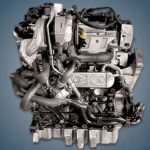The 1.5-liter Volkswagen DACA 1.5 TSI turbo engine was first introduced in 2016 and a year later began to be installed on such popular concern models as the Golf 7 and Seat Leon 3. There is a particularly economical modification of such a power unit with the BlueMotion index.
The EA211 series includes: CWVA, CWVB, CJZA, CJZB, CHPA, CMBA, CXSA, CZCA, CZDA, CZEA, DJKA, DACA, DADA.
Specifications
| Production years | since 2016 |
| Displacement, cc | 1498 |
| Fuel system | direct injection |
| Power output, hp | 130 |
| Torque output, Nm | 200 |
| Cylinder block | aluminum R4 |
| Block head | aluminum 16v |
| Cylinder bore, mm | 74.5 |
| Piston stroke, mm | 85.9 |
| Compression ratio | 12.5 |
| Features | DOHC, ACT |
| Hydraulic lifters | yes |
| Timing drive | belt |
| Phase regulator | on both shafts |
| Turbocharging | VGT |
| Recommended engine oil | 0W-20 |
| Engine oil capacity, liter | 4.3 |
| Fuel type | petrol |
| Euro standards | EURO 6 |
| Fuel consumption, L/100 km (for VW Golf Sportsvan 2018) — city — highway — combined |
6.2 4.4 5.1 |
| Engine lifespan, km | ~250 000 |
The engine was installed on:
- Seat Leon 3 (5F) in 2018 – 2020; Leon 4 (KL) since 2020;
- Volkswagen Golf 7 (5G) in 2017 – 2020; Golf 8 (CD) since 2020;
- Volkswagen Golf Sportsvan 1 (AM) in 2017 – 2020.
Disadvantages of the VW DACA engine
- These units have just begun to be installed and there is little information about their reliability.
- The engine is very demanding on fuel quality.
- A turbine with variable geometry has not been installed on mass-produced gasoline engines before.
- On specialized forums, they complain about jerky operation of the motor at low speeds.






